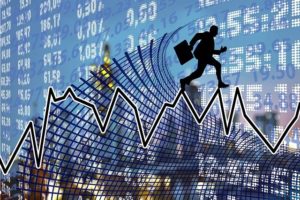Economics experts make it their job to understand the financial engine that keeps business spinning. The MBA degree has been the gold standard in business education for decades. Economics MBA programs are designed for graduate business students. It gives unique insight into how economic principles impact the business world. Business professionals armed with this degree develop powerful quantitative reasoning. They learn how to apply economic theory to practical business decision-making and planning.
Potential business students with minds for markets, money, and all things financial may discover a great fit in an MBA in economics. With a combination of business an economics theory, this degree could set them an excellent career path. An Economics Online MBA is associated with many things: advanced job positions, exceptional career growth, and high earning potential. MBA grads are in high demand. And thanks to distance and part-time degree programs, these MBA programs are more accessible than they ever have been.
If you are researching this degree path, you may have a lot of questions. Where can you find work with an MBA in economics? What are the pros and cons of pursuing this degree? How much will an MBA in economics cost? Let’s dive in!

What is Economics?
Whether you’re running a thriving organization in a major city or humbly living off the land in a small rural homestead, you play a role in economics. You are simultaneously participating in the economy and being affected by its principles. Making the right decisions in business and personal finances is important. These decision depend heavily on a general understanding of economics.
Economics can be defined as the social science that stresses the production, distribution, and consumption of goods and services. It includes the interactions and behavior of economic agents and how economies work. As the American Economic Association explains, “economics intersects various disciplines, from data science to math to politics. There are many powerful applications for economics, from education and business to health and the environment.”
The History of Economics
Economics exists as a social science. It seeks to analyze and interpret wealth’s production, distribution, and consumption. In the 19th century, economics was a gentleman of leisure’s interest and the vocation of only a few academics. Economists worked on economic policy. Yet, they were rarely consulted by legislators before decisions were made.
Today, nearly all governments, international agencies, and large commercial banks have their own staff of economists. Many of the world’s economists commit their time to teaching economics in universities and colleges. Still, most work in various advisory or research capacities. Economists can be found in the federal government, economics consulting firms, or industry. Other economics experts are employed in business administration, accounting, commerce, and marketing. While they are trained as economists, their professional expertise falls within different fields.
Age of Economists
We now live in “the age of economists,” as the demand for these professionals’ services seems insatiable. In the United States alone, over 400 institutions of higher learning grant nearly one-thousand new PhDs in economics annually.

Neatly defining the scope of economics has always been a struggle. Many agree with leading 19th-century English economist, Alfred Marshall, when he stated that economics is “a study of mankind in the ordinary business of life; it examines that part of individual and social action which is most closely connected with the attainment, and with the use of the material requisites of wellbeing.”
English economist Lionel Robbins defined economics in the 20th century as the science which studies human behavior in the relation between (given) ends and scarce means which have alternative uses. Robbins argued that economics is the science of economizing.
While his definition explains one of the striking characteristics of the economist’s understanding, it is at once too wide (as it would include the game of chess in economics) and too narrow (as it would exclude the study of the price level and the national income). The only foolproof definition is attributed to Canadian economist Jacob Viner. He said that “economics is what economists do.”
Essential Elements
While it may be challenging to define economics, it is not hard to indicate the questions and concerns economists have. Much of their work is to analyze the forces determining prices—the cost of goods and services and the cost of the resources used to produce them.
This process involves recognizing two essential elements:
- what governs how work, machines, and land are combined in production
- how consumers and sellers are connected in a functioning market
Because prices of things must be interrelated, economists ask how such a “market mechanism” or “price system” hangs together. Also, what conditions are needed for its survival.
What is an Economics Online MBA?

Before getting into the weeds of the degree programs and specific career paths associated with this business credential, let’s answer the most basic question: what is an online economics MBA?
Economics Online MBA Programs are a traditional distance MBA specializing in Economics. The elective classes included in the online MBA curriculum focus on economics. Distance learners develop a deep understanding of business sectors rooted in economic principles through an economics emphasis.
Examples of this may include:
Purchasing power
Global markets
Consumer behavior
Local economies
Public policy
Business Fundamentals
Unlike an Economics-focused Master of Arts (MA) or Master of Science (MS), an MBA in Economics is a Master of Business Administration (MBA) at its core. MBA students gain a broad understanding of the various fields of the business world. Then they will dive into a concentrated focus on how economics drive business. In contrast to an MBA, MA and MS degrees in economics focus more of their curriculum on economics. They then only covering business as it relates to economic principles.
Most traditional MBAs take two years to complete on a full-time basis. Accelerated MBA programs are also available. These programs compress the coursework into a twelve- or eighteen-month experience. Students wishing to work on their degrees part-time typically take three to four years to earn an MBA in economics.
An Online MBA Economics Curriculum
Business touches on every aspect of modern society, from law and human behavior to statistics and technology. For this reason, online MBAs are designed to be an interdisciplinary program. Students will study various areas, from information technology to accounting and marketing. Graduate students in business learn how organizations work. They receive formal training in the knowledge and skills required for business success, including communication, ethics, and leadership.

With business and economics existing as behemoth topics, there are no two business schools with identical Economics MBA curricula. However, most departments follow the same general pattern. Most consist of core business courses, managerial economics concentration courses, a capstone, and a hands-on learning component.
Since an Economics Online MBA is a business degree, the business core courses will include approximately twenty-seven credits. The business economics specialization will be limited to twelve or fewer credits. Most business schools give distance learners a set curriculum to be completed in a preferred sequence rather than a list of electives, particularly for the online MBA core courses.
Courses within an Economics Online MBA
Courses within an MBA core may include:
-Managerial Accounting
-Finance
-Operations Management
-Business Law
-Ethics
-Business Communications
-Leadership
-Human Resources
-Strategic Management
-Marketing
-International Business
Graduate students first establish a solid business foundation through core classes. They then take the economics MBA specialization courses. These emphasis courses will vary in title and content from school to school.
Typical economics titles include:
-Econometrics
-Principles of Economics
-Math and Statistics for Economics
-Macroeconomics
-Microeconomics
-Economic Analysis
-Managerial Economics
-Economic Development
-Labor Economics
-Health Economics
-Global Economics

Many online programs culminate in a comprehensive project or research-based capstone. The final component of the program typically consumes one or two Online MBA courses. It challenges business economics students to apply their prior learning to fixing a problem in economics as it applies to the business world.
MBAs may also complete an experiential learning component, including internships, externships, or practicums. These experiences allow students to use their classroom learning in the field. They develop relevant and applicable online education while advancing their workplace experience.
Students in Online MBA Economics
Research indicates that modern graduate students are typically mid-career professionals. This means they hold professional positions and often raise children while pursuing their MBAs. This is no different for MBAs as the average MBA student is 27 years old and has acquired some work experience. These business students are usually looking to advance their existing careers. Some are interested in making a career change with an advanced degree. They do this all while working for an organization that may require long hours, a high level of commitment, and business travel.
The key to finding the right business school to pursue your online economics MBA program is to make sure it offers the right curriculum through the best format for your career aspirations and lifestyle.
Why Pursue an Economics MBA Program Online?
Working professionals with career and personal obligations may discover that an online MBA with an Economics specialization is optimal for completing their degree. When considering online Economics MBA Programs, potential online students will want to think about priorities. Do they care about institutional prestige, academic quality, flexibility, or tuition rates the most? Many of the nation’s best business schools have online Economics specializations. Some are specific to a particular business field, like Health or Public Policy.
Curriculum
An online Economics MBA’s curriculum will be identical to or like the curriculum featured within an on-campus program. Distance learners can expect an MBA business core, economics courses, capstone research or project, and experiential learning content. Most Online MBA courses are delivered through asynchronous content. This means written lessons and pre-recorded lectures. Some offer synchronous content with including live video conferences.
Networking
One issue that gives some potential distance learners pause for concern is connection. Some worry about missing out on personal connections and face-to-face networking. An impactful professional network is one of the main reasons businesspeople attend business school. Online MBA students need to make an extra effort to forge connections that can naturally incubate in on-campus programs. Online b-schools address this in many ways. They offer virtual networking social groups and group discussions and assignments. Cohort-based models in which students enroll, develop, and graduate at the same pace are also helpful for students forging lasting relationships in business school.
Concurrent Experience and Education
A big positive attribute of the Online MBA is to allow students to gain experience and education at the same time. This means that they will gain the same amount of experience and education at twice the rate of their on-campus peers. Online MBA students also get to apply learned skills and theories in real time in their workplace. They then get to discuss their opportunities and failures with their classmates and professors. This continual learning and growing is an huge advantage for all online students.
The Cost of an Online MBA in Economics

Graduate students interested in economics automatically think about the money. They examine the cost of an Online MBA versus its return on investment. Besides the cost of tuition, some business school students risk missing out on earned income when away from work.
MBA students can also face opportunity costs. Meaning, the professional opportunities they may miss out on while engaged with their MBA studies. These variables add up to a significant investment. Potential business students will want to consider carefully and plan accordingly.
Tuition
It is an expensive investment when it comes to MBA tuition. Top-tier business schools like Wharton and Harvard carry a price tag of over $150,000. The cost of education for smaller private schools and state universities can be a significant expense. It can fall anywhere between $75,000 and $100,000. Considering the usual fees, textbook costs, computer and internet, and time away from work, it’s clear that the final price is significantly higher.
How does an MBA student meet this expense? Suppose you’re interested in advancing your current career with an online MBA in Economics. In that case, your current employer may realize that your potential to add value to the organization with a higher education makes it worthwhile to financially back your MBA. Investopedia says that large firms like Intel and Wells Fargo are likely to pay for their employees to earn an MBA. Employers with fewer resources to support staff education may sponsor a percentage of the cost of tuition.
Remember there are lots of choices in the best Online MBA Programs in the country. While some might reach over $100,000, there are also top affordable programs offered under $20,000.
Jobs an MBA in Economics Qualifies You For
Economics Online MBA Programs give professionals training in applying big-picture thinking to general business management skills. This training can qualify them for many positions like:
-Pricing analysts
-Global managers
-Financial analysts
-Management consultants
-Economic forecasters
–Market research consultants
-Entrepreneurs and small business owners
These positions provide a margin for upward growth. This training allows professionals to take on leadership positions. They go on to perform as supervisors, department heads, and managers. MBAs can also develop niche expertise in a specific business area, like Education, Clean Energy, or Risk Management.
Salary Potential for Economics Online MBA Graduates

Realizing a degree in economics from an economic perspective makes perfect sense. Graduate students have made a significant investment in tuition. They should expect a substantial salary to justify the expense. That is where an online MBA in economics reveals its value. According to Payscale, a graduate student holding a Master of Business Administration with a Finance or Economics concentration can earn an average salary of $103,000.
The results only get better from there. Poets and Quants’ recent survey of MBA concentrations found that some specializations yield more advantages throughout a professional’s career. Financial consulting tops the list. Some professionals with these credentials doubled their salaries in early and mid-career. Their salaries moved up from over $60,000 to over $135,000. The Bureau of Labor Statistics lists economist’s median salary over $100,000.
Places an Online Economics MBA Can Take You
One of the many perks of an online MBA in Economics is its flexibility. Economic principles are at play in every business sector, so MBAs aren’t limited to one area or industry in their job search. There are a great number of opportunities in the private and public sectors of:
-Retail
-Banking
-Finance
-Government
-Consulting
-Insurance
-Transportation
-Manufacturing
-Marketing
-Telecommunications
-Utilities
Economics MBA grads find work in the public and private sectors. Fortune 500 corporations and financial institutions top numerous lists of employers for this degree, including:
-J.P. Morgan Chase
-Morgan Stanley
-Atkore International
-Banco Santander
-General Electric (GE) Aviation
Working for a Fortune 500 or large corporation tends to include excellent benefits and an attractive salary. As a valued large corporation employee, you can expect certain benfits. Many recieve excellent health insurance, ample leave opportunities, attractive stock options, and healthy bonuses. Large companies also provide room for professional growth. They offer access to a professional network, encouraging mentors, skill training, satisfying responsibilities, and promotion opportunities.
Differences Between an Economics MBA and a Master’s in Economics

Professionals looking to further their careers in business management can see how earning an MBA degree is an obvious way to get ahead. But how does a specialized degree in economic theory stack up against the general business program with a specialization? Which economics degree should you choose?
MBA and non-MBA programs have unique pros and cons. So, it is vital to list and evaluate your long-term goals before choosing which direction to take your advanced education. While there are many elements to consider, it comes down to figuring out the skills you are trying to obtain. What positions you see yourself pursuing once your program is complete?
Some highlights of comparison:
-An MBA can be more expensive to pursue than an online master’s in finance or economics.
-Online MBA programs are broader in nature than master’s programs in economics that provide a deeper and narrower focus.
-A master’s in economics typically requires more robust mathematics experience and skill.
-MBAs traditionally find more earning potential
-Online MBAs give a general overview of business and leadership skills
-Students can enter into an Online MBA program with a variety of different bachelor’s degrees
The Online MBA Degree
Working professionals obtain an Online MBA degree after spending some time in the workforce. Some of the nation’s best MBA programs require It. Many specify that program candidates have practical work experience before acceptance.
An MBA’s curriculum covers finance and economics, but it remains more general and includes other business topics. All advanced business degrees require solid math skills. Yet, graduate students will discover that MBA classes need less abstract mathematical theory than graduate classes in economics. Working knowledge of algebra is often enough for success in an online MBA program.
Many employers today prefer job candidates whose business education encompasses the bigger picture. An MBA certainly fits that bill. There’s a benefit in learning something about various disciplines, including marketing, operations management, information systems, human resources, and business and nonprofit management. Students get exposure to all these areas within a typical MBA program. They also learn how different parts of an organization relate to one another.
A recent report by the GMAC, Graduate Management Admission Council, found that MBA grads tend to earn more than those who follow a narrower education track. MBA students earned a median starting salary of over $100,000 in the survey, compared to a reported $85,000 for graduate students with an MA in economics.
A Master’s in Economics Degree
Pursuing a master’s degree in economics means diving deep into investment analysis, corporate finance, risk analysis, and forecasting. The curriculum within this program includes lessons on econometrics, local economic development, microeconomics, and macroeconomics. These more focused programs tend to attract graduate students who are more robust in critical thinking and quantitative analysis.
The cost of obtaining a business economics degree varies depending on the school. However, it is generally lower than the price of an MBA. The NCES, National Center for Education Statistics, estimates that degrees cost from $10,000 to 25,000 annually. But keep in mind that public institutions usually cost less than private schools.
Classes in economics and finance typically require taking extensive mathematics prerequisites. Graduate-level economics students usually take advanced math courses before being admitted. Thse courses include statistics, differential calculus, and integral calculus. Furthermore, top universities prefer candidates with experience in real analysis, linear algebra, and multivariate calculus. They also expect prospective students to hold a bachelor’s degree in economics or a related field.
Where Can Prospective Students find an Online MBA Economics?
Prospective Online MBA students interested in economics specializations have many degrees to choose from. Ball State University offers students an Online MBA with a concentration in Health Economics, Policy, and Administration. Wright State University offers a top Online MBA degree in Business Economics. Murray State University houses a flexible Online MBA with a concentration in Economic Development.
There are many options for business economics students. And with the continual increase of Online MBA Programs, options will only continue to grow.
Action Plans

Once you believe that an Economics Online MBA might be right for you, it is time to do some specific research and fact-finding.
1. Go Online to Learn More
You can find out a lot by scanning a business school’s website. Read about certain programs and course descriptions. Make sure to find out how long programs last and what kind of time requirement will be asked of you.
This is also a good time to research some top school rankings. School rankings are a great place to give you an idea of a school’s prestige. But also, if you dig a little deeper, you can find information about their admissions, student population, and program information.
2. Contact Business Schools
B-schools work hard to make it easy for prospective students to connect to their degrees. It is common to find drop-down menus which allow online researchers to “ask an expert.” This allows you to connect to the business school’s admissions department with a specific question.
You may also want to reach out to school representatives through email. You can get answers about MBA curriculum, program structure, and tuition. It is also essential to get a detailed list of application requirements to see how and when admissions happens.
List out the information you need to offer:
- undergraduate degree transcripts,
- resume,
- letters of recommendation,
- and exam scores.
3. Interview Alum
Business schools can also provide you with the contact information of recent grads and seasoned alumni. Taking the time to interview these ex-students will speak volumes about what to expect within specific MBA programs. They can also result in your making professional contacts that may prove valuable in the coming years.
This guide was designed to help you learn more about the online MBA with an Economics concentration. This is one of the most respected and admired degrees that a graduate student can pursue in business schools worldwide.
Related Resources:
Best Online MBA Programs
Most Affordable Online MBA Programs
Alternatives to an Online MBA
Best Marketing MBA Jobs
Highest Paying MBA Concentrations
